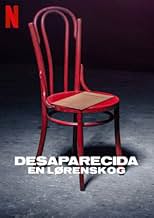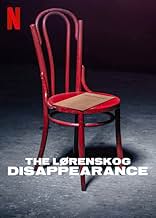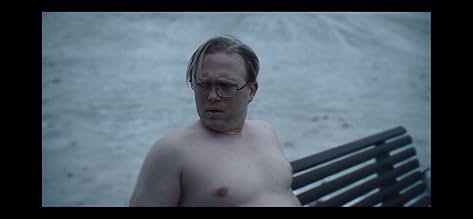Desaparecida en Lørenskog
Título original: Forsvinningen - Lørenskog 31. oktober 2018
CALIFICACIÓN DE IMDb
6.0/10
3.2 k
TU CALIFICACIÓN
Desaparece la esposa de un millonario, y la policía debe lidiar con la prensa y engañosos informantes para llegar a la verdad. Basada en hechos reales.Desaparece la esposa de un millonario, y la policía debe lidiar con la prensa y engañosos informantes para llegar a la verdad. Basada en hechos reales.Desaparece la esposa de un millonario, y la policía debe lidiar con la prensa y engañosos informantes para llegar a la verdad. Basada en hechos reales.
Explorar episodios
Opiniones destacadas
Fascinating, detailed, intriguing examination of a real-life missing person case. Each episode follows one of the parties involved, ie the police, the journalists, the lawyers, and the story emerges from this fractured looking glass. All good and original and engaging so far. However, when it comes to the 5th and final episode, this series simply just pulls up the drawbridge on the story and gives nothing to the viewer by way of theory, explanation, new perspective. OK it's a 'true' story, more or less, and as such the jury is still out and no one has been convicted. But ending the series with little more than a shrug just confirms this as s a TV experience this is just a distraction for a few hours and with nothing to contribute to the subject it asks us to consider. To be avoided.
A Norwegian thriller based on true events.
This kidnapping story could have been packed in one movie and not divided in seven hours episodes. Too long because it couldn't keep enough my attention with suspense or intriguing elements. At the end of the second part I switched off. Okay, in the first part these ingredients were shown but the longer it run the more I was bored to continue watching these seven part limited series. Yes, luckily only limited. Watch instead the top Hollywood kidnapping movies Trapped, Cellular with Kim Basinger, Panic Room with Julianne Moore or The Call with Halle Berry.
This kidnapping story could have been packed in one movie and not divided in seven hours episodes. Too long because it couldn't keep enough my attention with suspense or intriguing elements. At the end of the second part I switched off. Okay, in the first part these ingredients were shown but the longer it run the more I was bored to continue watching these seven part limited series. Yes, luckily only limited. Watch instead the top Hollywood kidnapping movies Trapped, Cellular with Kim Basinger, Panic Room with Julianne Moore or The Call with Halle Berry.
Vaguely remember the case on which this series is based. It was also relatively well reported here in Finland. The series follows events from different angles and perspectives. The series is followed episode by episode from the point of view of the police, lawyers, journalists and relatives.
I used to be in favour of a non-linear and multi-perspective series. Over time, however, the problem has become that these elements have become a way of prolonging the series without adding any value to the story itself or depth to the characters. I like slow-burning series, but there has to be a reason for that slow-burning. Nowadays, many series should just be a 1,5h movie because there is no true content for many episodes.
Fortunately, however, this series was different. Five episodes of guaranteed quality. I found that I actually liked almost every character in the series. I could relate to their perspectives and attitudes. The series illustrates well how easily our history and temperament can affect our ability to look at things objectively.
I also liked the fact that the personal lives of the main characters were referred and shown, but mostly in a condensed form. Glimpses. Everyone can then draw their own conclusions. For example, many police series stray far too much from the plot itself to deal with family traumas and other relationship issues. Of course, human being is a whole, but often too much emphasis is placed on these subplots.
Many people seem to be annoyed by the end of the series. The series is largely based on real events, including the names. In such cases, you cannot make your own artistic decisions. Personally, I liked the ending of the series. The way it affected the lives of the people involved.
It also reminded me of a case we had here in Finland. It was the case of Anneli Auer. She supposedly murdered her husband. However, the director of the investigation forbid the investigators of investigating Anneli Auer, even though she was the wife of the murdered and was present when the murder took place. Anneli Auer is an obvious psychopath and she was very good at manipulation. Anneli Auer was not taken as a suspect until two years after the murder, at which point no proper investigation could be carried out. The court acquitted Anneli Auer, even though she is very probably behind the murder of her husband. It really reminded this case in many ways.
I used to be in favour of a non-linear and multi-perspective series. Over time, however, the problem has become that these elements have become a way of prolonging the series without adding any value to the story itself or depth to the characters. I like slow-burning series, but there has to be a reason for that slow-burning. Nowadays, many series should just be a 1,5h movie because there is no true content for many episodes.
Fortunately, however, this series was different. Five episodes of guaranteed quality. I found that I actually liked almost every character in the series. I could relate to their perspectives and attitudes. The series illustrates well how easily our history and temperament can affect our ability to look at things objectively.
I also liked the fact that the personal lives of the main characters were referred and shown, but mostly in a condensed form. Glimpses. Everyone can then draw their own conclusions. For example, many police series stray far too much from the plot itself to deal with family traumas and other relationship issues. Of course, human being is a whole, but often too much emphasis is placed on these subplots.
Many people seem to be annoyed by the end of the series. The series is largely based on real events, including the names. In such cases, you cannot make your own artistic decisions. Personally, I liked the ending of the series. The way it affected the lives of the people involved.
It also reminded me of a case we had here in Finland. It was the case of Anneli Auer. She supposedly murdered her husband. However, the director of the investigation forbid the investigators of investigating Anneli Auer, even though she was the wife of the murdered and was present when the murder took place. Anneli Auer is an obvious psychopath and she was very good at manipulation. Anneli Auer was not taken as a suspect until two years after the murder, at which point no proper investigation could be carried out. The court acquitted Anneli Auer, even though she is very probably behind the murder of her husband. It really reminded this case in many ways.
8rbod
I don't know how this could be made unless it is explicitly sanctioned by both the authority that investigates and charges crime AND the people that make up the persons of interest. I can't imagine why anyone would agree to it.
Not what I would call a documentary.
Anyway, aside from that I did enjoy it as an entertainment, which I think is problematic as a "true" story.
Now my problem with the presentation in one crucial aspect of "evidence" as presented. The language as we know is Norwegian. I watched it dubbed in English with English captions. As is often the case, the spoken dialogue does not match the captions. Normally this is not a problem, but: Tom Hagen is about 70 and has been married for 49 years to his disappeared wife.
The film has the prenuptial agreement signed in 1993 I believe, which would have put their wedding at around 1973.
1993 is 29 years ago, not 49. Giving more weight to this observation, the dialogue says prenup, the caption says marital agreement. Ordinarily one would not make a fuss over this language discrepancy, except, you cannot have a prenuptial agreement when you've already been married for 20 years.
So, this was not a prenup but an agreement made after 20 years of marriage. It casts an entirely different light on the story, because although it was clear an error was made, what the error was was not clear. Was the year of the agreement 1973 and therefore a prenup (no, I don't think so) or was it not a prenup but a marital agreement made after 20 years of marriage (yes, I think) Although I figured it out I was not 100 percent sure and thought about it the whole time I was watching which was a distraction I could have done without.
It is not evidence of a crime, however, but changes the idea of motive.
If one were not paying close attention to do the math, and not having captions on they saw a different film from me.
I am very disappointed.
Not what I would call a documentary.
Anyway, aside from that I did enjoy it as an entertainment, which I think is problematic as a "true" story.
Now my problem with the presentation in one crucial aspect of "evidence" as presented. The language as we know is Norwegian. I watched it dubbed in English with English captions. As is often the case, the spoken dialogue does not match the captions. Normally this is not a problem, but: Tom Hagen is about 70 and has been married for 49 years to his disappeared wife.
The film has the prenuptial agreement signed in 1993 I believe, which would have put their wedding at around 1973.
1993 is 29 years ago, not 49. Giving more weight to this observation, the dialogue says prenup, the caption says marital agreement. Ordinarily one would not make a fuss over this language discrepancy, except, you cannot have a prenuptial agreement when you've already been married for 20 years.
So, this was not a prenup but an agreement made after 20 years of marriage. It casts an entirely different light on the story, because although it was clear an error was made, what the error was was not clear. Was the year of the agreement 1973 and therefore a prenup (no, I don't think so) or was it not a prenup but a marital agreement made after 20 years of marriage (yes, I think) Although I figured it out I was not 100 percent sure and thought about it the whole time I was watching which was a distraction I could have done without.
It is not evidence of a crime, however, but changes the idea of motive.
If one were not paying close attention to do the math, and not having captions on they saw a different film from me.
I am very disappointed.
I stayed with this unusual mystery drama from Norway right to the end, but really rather wish I hadn't. It's claimed that the story was based on real-life events, but if that really was the case, then truth must indeed be stranger than fiction.
A middle-aged woman is forcibly kidnapped from her home while her billionaire husband is away. But no ransom note is immediately forthcoming and as home truths emerge about the state of the couple's marriage and in particular the elderly husband's extra-marital life, the mystery grows with every passing day, the latter documented by periodic datelines coming up on screen.
The two main cops assigned to the case are a woman and man team, she, a white woman, the dogged proceedural type, he, a younger black man, willing to think and work outside the box to try to crack the case, even if it means engaging with the criminal fraternity. The woman, as is commonplace in dramas like this, has family issues, in the form of her father who suffers from Alzheimer's Disease.
Also on the case is a determined crime reporter from a daily national newspaper who finally gets a break which takes him to Sweden, but unfortunately for him he's identified and gets badly beaten up for his trouble. It all goes down or so you're led to believe, to a climactic conclusion which at least from where I was sitting, seemed to leave the viewer high and dry.
Up until that point, it was just about okay as these Scandi-noir series go. With each episode coming at the story from a different angle, I found it too difficult to join the dots in the narrative which may have contributed to my disillusionment and dissatisfaction with the ending.
I appreciate that the original and unusual prismatic format adopted here may have been an attempt to freshen up the genre, but for me, it just felt like I was led up the path and in the end left absolutely nowhere by an over-enigmatic ending.
A middle-aged woman is forcibly kidnapped from her home while her billionaire husband is away. But no ransom note is immediately forthcoming and as home truths emerge about the state of the couple's marriage and in particular the elderly husband's extra-marital life, the mystery grows with every passing day, the latter documented by periodic datelines coming up on screen.
The two main cops assigned to the case are a woman and man team, she, a white woman, the dogged proceedural type, he, a younger black man, willing to think and work outside the box to try to crack the case, even if it means engaging with the criminal fraternity. The woman, as is commonplace in dramas like this, has family issues, in the form of her father who suffers from Alzheimer's Disease.
Also on the case is a determined crime reporter from a daily national newspaper who finally gets a break which takes him to Sweden, but unfortunately for him he's identified and gets badly beaten up for his trouble. It all goes down or so you're led to believe, to a climactic conclusion which at least from where I was sitting, seemed to leave the viewer high and dry.
Up until that point, it was just about okay as these Scandi-noir series go. With each episode coming at the story from a different angle, I found it too difficult to join the dots in the narrative which may have contributed to my disillusionment and dissatisfaction with the ending.
I appreciate that the original and unusual prismatic format adopted here may have been an attempt to freshen up the genre, but for me, it just felt like I was led up the path and in the end left absolutely nowhere by an over-enigmatic ending.
¿Sabías que…?
- TriviaTodas las entradas contienen spoilers
Selecciones populares
Inicia sesión para calificar y agrega a la lista de videos para obtener recomendaciones personalizadas
- How many seasons does The Lørenskog Disappearance have?Con tecnología de Alexa
Detalles
- Fecha de lanzamiento
- País de origen
- Sitio oficial
- Idioma
- También se conoce como
- The Lørenskog Disappearance
- Productora
- Ver más créditos de la compañía en IMDbPro
- Tiempo de ejecución52 minutos
- Color
- Mezcla de sonido
Contribuir a esta página
Sugiere una edición o agrega el contenido que falta


























